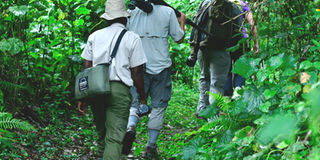Govt shifts focus to local tourism

For a long time, government has relied on foreigners to grow tourism earnings. PHOTO | EDGAR R. BATTE
Government and tourism stakeholders are discussing strategies through which they can revive the tourism sector with focus and resources shifted to the domestic market.
The industry, which has been one of the most affected as a result of Covid-19, had for about five years been Uganda’s leading foreign exchange earner.
Speaking during the Domestic Tourism Strategy dialogue in Kampala on Tuesday, Ms Doreen Katusiime, Tourism Ministry permanent secretary, said the domestic tourism market has become a key focus in government’s promotional efforts, noting that world over, successful tourism destinations are characterised by a strong domestic market that is less prone to seasonal fluctuations.
“The domestic market represents an untapped value whose current spending pattern has less leisure and travel considerations,” she said, observing that Covid-19 has exposed the fragility of the industry that has been mainly relying on foreigners.
The tourism sector, she said, had reported job losses and redundancies of up to 70 per cent, loss of incomes at enterprise and national level, loss of foreign exchange and threats to conservation, which presents a wider threat to the economy thus the need to find a lasting and secure fix.
Government had projected to reach four million arrivals per annum by 2022. However, the current Covid-19 disruptions call for a new strategy which will realign the industry to the new realities and demands.
Ms Katusiime said there is unexploited potential in the domestic market and will be a reliable anchor in the face of a multiplicity of challenges.
But the key factor will be how tourism becomes more affordable to the local market as well as capitalising on the geographic spread of tourism features.
“There is increasing visitation by the Ugandans to the national parks, and other tourism features such as source of the Nile, Uganda Wildlife Education Centre, Uganda Museum, beach fronts and Islands,” she said.
However, no data has been provided to support Ms Katusiime assertions but over the years, there have been concerns over the affordability of tourism to particularly Ugandans, who seem to be pushed out because of pricing.
Ms Katusiime said government is counting on the improved accessibility and infrastructural connectivity to compel Ugandans into being part of the new tourism strategy.
Justification
Uganda’s domestic demand is supported by the growing size of the middle class, the influx of the corporate sector and the ICT revolution that has made information more accessible.
“More Ugandans have discretionary income and the means to widen their expenditure profiles. These positive signs reflect an opportunity that is largely untapped,” Ms Katusiime said.
According to the 2020 study by United Nations in Uganda on the socio-economic assessment of the Covid-19, Uganda’s tourism is projected to register a loss of more than $5b in the next years which calls for a new approach and engagement.


